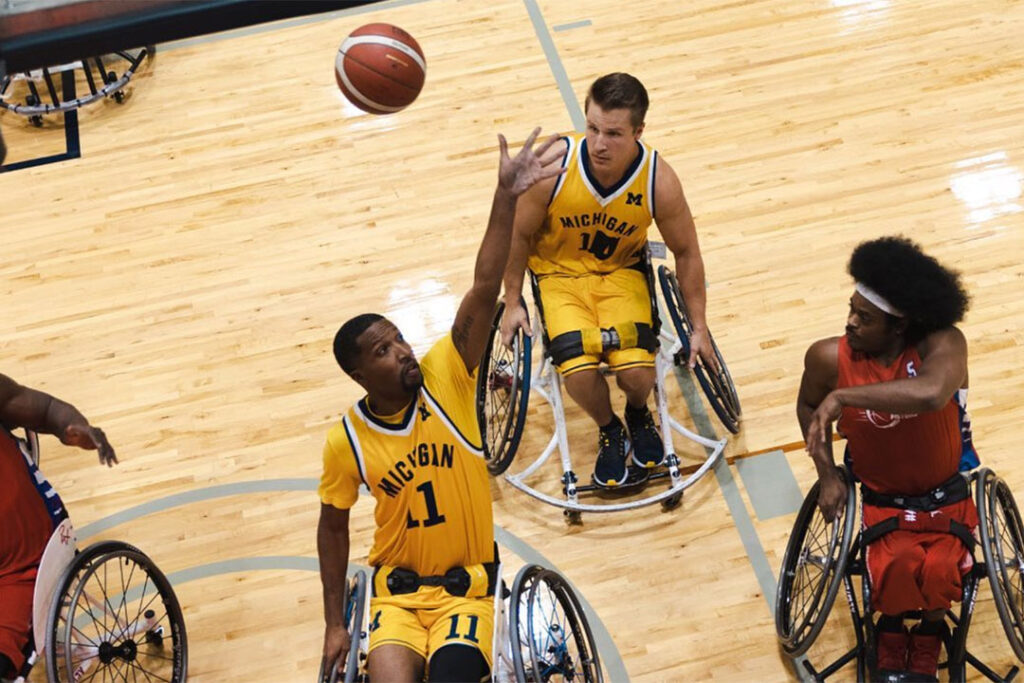Hail yes
Established in 2018, the University’s Adaptive Sports & Fitness program has quickly gained recognition for its competitive teams, not to mention its impact on the community to support the growth and development of adaptive sports. Also known as para sports, adaptive sports are competitive or recreational sports for people with and without disabilities. Modifications of rules or equipment allow for equitable participation (in basketball and tennis, for example). Some adaptive sports have been specifically designed for persons with a disability and do not have an able-bodied equivalent activity. (Images come from the Instagram account @rgkwheelchairs.)
-
Did someone say, March Madness?
Students, staff, and faculty with and without disabilities are welcome to get involved in the Adaptive Sports & Fitness program through such sports as wheelchair basketball, wheelchair tennis, adaptive track and field, and para-equestrian.
-
A gentlemen’s agreement
Dr. Oluwaferanmi Okanlami (right) is not only a terrific tennis player, he also is a professor at Michigan Medicine and the director of Student Accessibility and Accommodation Services at U-M. He oversees the office of Services for Students with Disabilities, two testing accommodation centers, and the Adaptive Sports & Fitness Program. In March, he was appointed to President Biden’s Council on Sports, Fitness, and Nutrition. He recently received a $1 million Visionary Award from the Craig H. Neilsen Foundation while he was a guest on “Good Morning, America.” The funds will advance and support his disability work.
-
All together now
The team in the Adaptive Sports & Fitness Program recently submitted the grant proposal “Prescription to Play” to help connect individuals living with spinal cord injuries (SCI) to local physical activity resources and provide continued support in the rehabilitation process. Proposed outcomes include an increase in awareness of, access to, and participation in physical activity programming for individuals living with SCI in Southeast Michigan.
-
Getting schooled
Alex Saleh, MSW ’21, chose his undergrad social work program in Pennsylvania specifically to play wheelchair basketball. U-M’s Adaptive Sports is working to embed adaptive sports and inclusive recreation as part of the physical education curriculum in Michigan public schools so athletes like Saleh can begin participating at an earlier age.
-
Role model
Cathryn Gray is an internationally ranked adaptive track and field athlete and a 4.0 student. She has competed in Spain in the World Paralympic Games and was the only female named as a U.S. Paralympic Track and Field All-American, in addition to being the 2017 javelin and discuss national champion. She is a podcaster and a contributing author for the book 100 Positive Sports Stories. “I want to be the role model I never had,” she says.
-
Three’s company
Wheelchair tennis players (from left) Caiden Baxter, Maria Velat, and Chris Jude take a break during a recent match. “Competing in sports has provided structure and benefited both my physical and mental health throughout my entire life,” Baxter says.
-
Winner!
“Winning was a culmination of the years I have spent working to get to this stage, but was also a testament of us buying into what the coaching staff was offering,” says Spencer Heslop, who recently graduated with a master’s degree in epidemiology from U-M’s School of Public Health. As a young, hungry tennis team, he noted, the players were willing to put in the time and energy.
-
Back in action
Coach Jessica Wynne, BA ’09, played on the Michigan Women’s Basketball team during her time at U-M. In 2011, she received a master’s degree in education of students with disabilities from City University of New York-Brooklyn College. Her coaching highlight so far: The 2022 Wheelchair Basketball Maize and Blue Game at Crisler Center. “The game was electric and it was a full-circle moment for me to be back in the arena,” she says.
-
A need for speed
Madeline Gustafson is an LSA student with plans to pursue a degree in biochemistry. She also has Cerebral Palsy. Although she participated in cheerleading and running groups in middle school, her high school did not offer adaptive athletics, leaving her unable to compete or pursue athletic endeavors. The Adaptive Sports Program at U-M allows her to reconnect with old passions and re-establish her love for running.











Marlene and Alex Miller - 1958
It is exciting to see this incredible team and the amazing athletes featured in this article. The Adam Miller Fund and the entire Miller family are proud sponsors and partners of ASF. Go Blue always
Reply
Jeffrey Miller - 1998
Thank you for featuring this wonderful program. This is Michigan at its best, leading the way to make sports, fitness and the entire collegiate experience more accessible and inclusive to everyone. Hail yes is right!
Reply
Rod Loewenthal - 1988
This is a fantastic program highlighting the “can do” spirit of Michigan.
Go Blue!
Rod Loewenthal
Reply